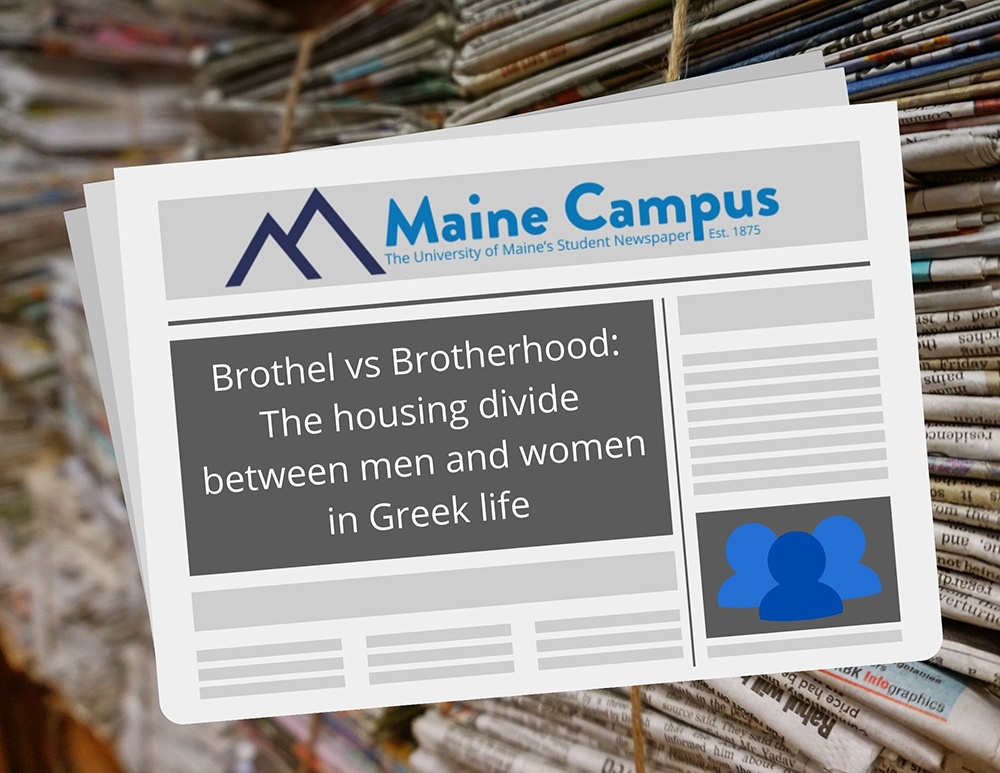Driving down College Avenue, alongside the University of Maine, you’ll pass numerous, extravagant fraternity houses with large Greek letters proudly displayed above their doorways一a representation of an age old tradition on many college campuses across the country. You’ll see members of UMaine’s 16 fraternities suntanning on their porches or playing frisbee in their front yards.
However, you don’t see the women that make up the eight sororities on UMaine’s campus. You won’t see any Greek letters of these organizations above any doorways. There is no indication that these sororities even exist on College Avenue. Instead, you’ll find these women in the basements of the residence halls on campus. Each sorority is assigned an underground oasis to perform all the duties that are required of them as a chapter, while up above, the fraternities of this campus are provided their very own homes to do so.
But this may not be the case any longer.
Chrissy Skidgel, a fourth–year nursing student and a sister of Alpha Omicron Pi at UMaine, began a sorority housing initiative last semester after learning that it was in fact possible for the women of Greek life at UMaine to have houses, but this possibility was never openly talked about.
The so-called “brothel rumor” could explain this discrepancy. The rumor says that only a certain number of women can live in a house before it’s labelled a brothel, according to The Daily Pennsylvanian.
Skidgel sent out a questionnaire to all members of Greek life, as well as posted it on the Facebook pages of the UMaine classes of 2022, 2023, 2024 and 2025. The form posed multiple questions, including if the participant was a member of Greek life themselves, if they were aware that sororities were permitted to have houses on campus, if they had heard of the “brothel rumor” and if so, what their understanding of it was as well as if active sorority members would be interested in having housing for their chapter on UMaine’s campus.
Skidgel emphasized that her main point in beginning this process was to ensure that sorority women had the opportunity to have a recognized house.
There were 217 total responses with 136 responses attributed to Greek life members. When these Greek life participants were asked if they had heard of the “brothel law” myth, 89.7% of them said that they had. For those women in Greek life, 94.1% said that they would be interested in having sorority housing.
During a recent All Greek meeting, Skidgel presented her housing initiative to all of Greek life. Her call to action was initiated by the question: “Who has heard of the brothel rumor as the reason why sororities are not allowed to have houses on campus?” Every hand went up in that room.
“That’s why I talked at the All Greek meeting. Because we decided that if this is going to be something that actually works, it needs to be all hands on deck. It just catches wind better if you have everyone involved, so I wanted to get a representative from each chapter to basically give me their own perspective on what their own chapter would want,” said Skidgel.
“The pandemic … revealed a lot of the inequality between [fraternities and sororities] on campus, because with all the pandemic restrictions, none of the [sisters] could go in their chapter rooms. All the [brothers] had their houses,” explained Skidgel as her primary motivation for beginning the housing initiative.
This fight is far more than just about sorority members being able to live in a house, but represents the sexism that permeates in all levels of society. These women don’t just want to be able to have a house to say that they have a house, but they want to be as equally represented as the fraternities on campus. If things are to change, we must begin at the root and work from there.









